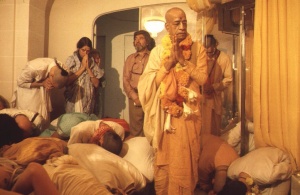SB 10.4.7: Difference between revisions
m (1 revision(s)) |
(Vanibot #0054 edit - transform synonyms into clickable links, which search similar occurrences) |
||
| (One intermediate revision by one other user not shown) | |||
| Line 1: | Line 1: | ||
{{info | {{info | ||
|speaker= | |speaker=Śukadeva Gosvāmī | ||
|listener=King | |listener=King Parīkṣit | ||
}} | }} | ||
[[Category:Srimad-Bhagavatam - Canto 10 Chapter 04|s07 ]] | |||
[[Category:Bhagavatam Verses Spoken by Sukadeva Gosvami - Vanisource|100407]] | |||
<div style="float:left">'''[[Srimad-Bhagavatam]] - [[SB 10|Tenth Canto]] - [[SB 10.4: The Atrocities of King Kamsa|Chapter 4: The Atrocities of King Kaḿsa]]'''</div> | |||
<div style="float:right">[[File:Go-previous.png|link=SB 10.4.6]] '''[[SB 10.4.6]] - [[SB 10.4.8]]''' [[File:Go-next.png|link=SB 10.4.8]]</div> | |||
{{RandomImage}} | |||
==== TEXT 7 ==== | ==== TEXT 7 ==== | ||
<div | <div class="verse"> | ||
śrī-śuka uvāca | :śrī-śuka uvāca | ||
upaguhyātmajām evaṁ | :upaguhyātmajām evaṁ | ||
rudatyā dīna-dīnavat | :rudatyā dīna-dīnavat | ||
yācitas tāṁ vinirbhartsya | :yācitas tāṁ vinirbhartsya | ||
hastād ācicchide khalaḥ | :hastād ācicchide khalaḥ | ||
</div> | </div> | ||
| Line 18: | Line 23: | ||
==== SYNONYMS ==== | ==== SYNONYMS ==== | ||
<div | <div class="synonyms"> | ||
śrī-śukaḥ | ''[//vanipedia.org/wiki/Special:VaniSearch?s=śrī&tab=syno_o&ds=1 śrī]-[//vanipedia.org/wiki/Special:VaniSearch?s=śukaḥ&tab=syno_o&ds=1 śukaḥ] [//vanipedia.org/wiki/Special:VaniSearch?s=uvāca&tab=syno_o&ds=1 uvāca]'' — Śrī Śukadeva Gosvāmī said; ''[//vanipedia.org/wiki/Special:VaniSearch?s=upaguhya&tab=syno_o&ds=1 upaguhya]'' — embracing; ''[//vanipedia.org/wiki/Special:VaniSearch?s=ātmajām&tab=syno_o&ds=1 ātmajām]'' — her daughter; ''[//vanipedia.org/wiki/Special:VaniSearch?s=evam&tab=syno_o&ds=1 evam]'' — in this way; ''[//vanipedia.org/wiki/Special:VaniSearch?s=rudatyā&tab=syno_o&ds=1 rudatyā]'' — by Devakī, who was crying; ''[//vanipedia.org/wiki/Special:VaniSearch?s=dīna&tab=syno_o&ds=1 dīna]-[//vanipedia.org/wiki/Special:VaniSearch?s=dīna&tab=syno_o&ds=1 dīna]-[//vanipedia.org/wiki/Special:VaniSearch?s=vat&tab=syno_o&ds=1 vat]'' — very piteously, like a poor woman; ''[//vanipedia.org/wiki/Special:VaniSearch?s=yācitaḥ&tab=syno_o&ds=1 yācitaḥ]'' — being begged; ''[//vanipedia.org/wiki/Special:VaniSearch?s=tām&tab=syno_o&ds=1 tām]'' — her (Devakī); ''[//vanipedia.org/wiki/Special:VaniSearch?s=vinirbhartsya&tab=syno_o&ds=1 vinirbhartsya]'' — chastising; ''[//vanipedia.org/wiki/Special:VaniSearch?s=hastāt&tab=syno_o&ds=1 hastāt]'' — from her hands; ''[//vanipedia.org/wiki/Special:VaniSearch?s=ācicchide&tab=syno_o&ds=1 ācicchide]'' — separated the child by force; ''[//vanipedia.org/wiki/Special:VaniSearch?s=khalaḥ&tab=syno_o&ds=1 khalaḥ]'' — Kaṁsa, the most cruel. | ||
</div> | </div> | ||
| Line 25: | Line 30: | ||
==== TRANSLATION ==== | ==== TRANSLATION ==== | ||
<div | <div class="translation"> | ||
Śukadeva Gosvāmī continued: Piteously embracing her daughter and crying, Devakī begged Kaṁsa for the child, but he was so cruel that he chastised her and forcibly snatched the child from her hands. | Śukadeva Gosvāmī continued: Piteously embracing her daughter and crying, Devakī begged Kaṁsa for the child, but he was so cruel that he chastised her and forcibly snatched the child from her hands. | ||
</div> | </div> | ||
| Line 32: | Line 37: | ||
==== PURPORT ==== | ==== PURPORT ==== | ||
<div | <div class="purport"> | ||
Although Devakī was crying like a very poor woman, actually she was not poor, and therefore the word used here is dīnavat. She had already given birth to Kṛṣṇa. Therefore, who could have been richer than she? Even the demigods had come to offer prayers to Devakī, but she played the part of a poor, piteously afflicted woman because she wanted to save the daughter of Yaśodā. | Although Devakī was crying like a very poor woman, actually she was not poor, and therefore the word used here is ''dīnavat''. She had already given birth to Kṛṣṇa. Therefore, who could have been richer than she? Even the demigods had come to offer prayers to Devakī, but she played the part of a poor, piteously afflicted woman because she wanted to save the daughter of Yaśodā. | ||
</div> | </div> | ||
__NOTOC__ | |||
<div style="float:right; clear:both;">[[File:Go-previous.png|link=SB 10.4.6]] '''[[SB 10.4.6]] - [[SB 10.4.8]]''' [[File:Go-next.png|link=SB 10.4.8]]</div> | |||
__NOTOC__ | |||
__NOEDITSECTION__ | |||
Latest revision as of 18:58, 17 February 2024

A.C. Bhaktivedanta Swami Prabhupada
TEXT 7
- śrī-śuka uvāca
- upaguhyātmajām evaṁ
- rudatyā dīna-dīnavat
- yācitas tāṁ vinirbhartsya
- hastād ācicchide khalaḥ
SYNONYMS
śrī-śukaḥ uvāca — Śrī Śukadeva Gosvāmī said; upaguhya — embracing; ātmajām — her daughter; evam — in this way; rudatyā — by Devakī, who was crying; dīna-dīna-vat — very piteously, like a poor woman; yācitaḥ — being begged; tām — her (Devakī); vinirbhartsya — chastising; hastāt — from her hands; ācicchide — separated the child by force; khalaḥ — Kaṁsa, the most cruel.
TRANSLATION
Śukadeva Gosvāmī continued: Piteously embracing her daughter and crying, Devakī begged Kaṁsa for the child, but he was so cruel that he chastised her and forcibly snatched the child from her hands.
PURPORT
Although Devakī was crying like a very poor woman, actually she was not poor, and therefore the word used here is dīnavat. She had already given birth to Kṛṣṇa. Therefore, who could have been richer than she? Even the demigods had come to offer prayers to Devakī, but she played the part of a poor, piteously afflicted woman because she wanted to save the daughter of Yaśodā.